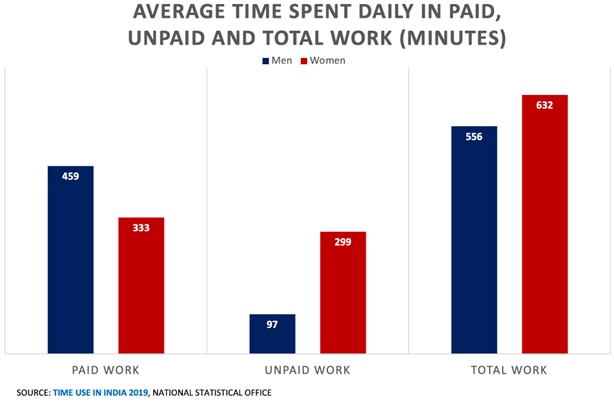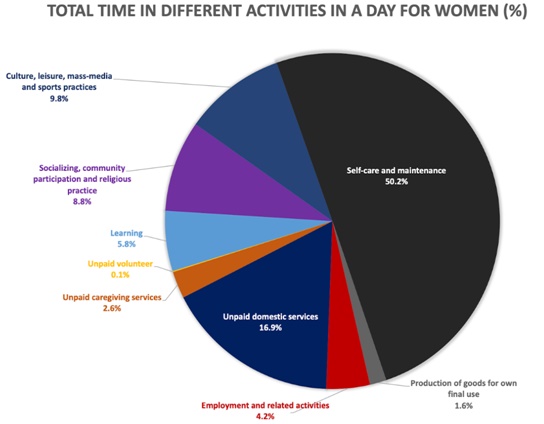(Mains GS2: Issues relating to development and management of Social Sector/Services relating to Health, Education, Human Resources.)
Context:
- Women everywhere carry a disproportionately higher burden of unpaid work, namely, unpaid domestic services as well as unpaid care of children, the old and the disabled for their respective households.
- Though this work contributes to overall well-being at the household level and collectively at the national level, it is invisible in the national database and particularly in national policies.
- The latest time-use survey on women’s and men’s work released by the National Sample Survey Office (NSSO) stated that women perform 10 times more unpaid care work than men.
Observations of the reports:
- Time Use Survey (TUS) is an important source of information on the time spent in unpaid caregiving activities, volunteer work, and unpaid domestic service producing activities of the household members.
- It also provides information on time spent on learning, socializing, leisure activities, self-care activities, etc., by the household members.
Key observations:
- It has revealed that only 38.2% of the Indian population participates in “employment and other related activities”, spending an average of 429 minutes (7 hours and 9 minutes) every day in these activities.
- The report states that women spend 238 minutes (four hours) more on unpaid work each day than men in India.
- The unequal distribution of unpaid care work, effectively, allows men to participate in the labour market
- Woman’s capacity to to participate in the labour market is limited even though men and women in a household spend the same total amount of time “working”.
- Male participation in paid work is over three times that of women.
- However, if we take into account paid and unpaid work, women’s participation rises to 85 per cent, while men are at 73 per cent.

Oxfam observation:
- Oxfam India’s studies on women’s unpaid care work in 2019 and 2020 observe that women have to work, no matter what the circumstances maybe.
- This is especially true for women from poorer households, where they not only shoulder high burden of unpaid work, but also have to take on paid work to supplement the meagre incomes of their male family members.
- Consequently, women are extremely time poor — they have no time to take care of their health and well-being.
- This, in turn, leads to lack of opportunities for pursuing education and employment.
- As a result, women are trapped in a vicious cycle, where high burden of unpaid work deny them basic human rights of health, education and employment.

Patriarchal norms:
- The unpaid work done by women is repetitive, boring and frequently drudgery — a 24-hour job without remuneration, promotions or retirement benefits.
- It restricts opportunities for women in the economy and in life.
- Women do this job not necessarily because they like it or are efficient in it, but because it is imposed on them by patriarchal norms.
- This unequal division of unpaid work between women and men is unfair and unjust and it deprives women of equal opportunities as men.
Implementation problems:
- For political parties to recognise this work is a positive development and the demand for wages for housewives has emerged from this concern.
- However, its implementation may create problems such as affordability of the government and calculation of the amounts.
- More important, these wages may confirm unpaid work as women’s work only, which would deny opportunities to women in the wider world.
- Payment of pension to old women (60+ years) may be a better idea to compensate them for their unpaid work.
Measures to be taken by the government:
- Governments could recognise unpaid work in the national database by a sound time-use survey and use the data in national policies.
- Government could relieve women’s burden of unpaid work by improving technology (e.g. better fuel for cooking) and providing better infrastructure (e.g. water at the doorstep).
- It also need to shift some unpaid work to the mainstream economy (e.g. childcare, care of the disabled, and care of the chronically sick), and making basic services (e.g. health and transportation) accessible to women.
- Government also could redistribute the work between men and women by providing different incentives and disincentives to men (e.g. mandatory training of men in housework, childcare, etc.) and financial incentives for sharing housework.
- These measures will give free time to women and open up new opportunities to them.
Unpaid work and the economy
- What is critical is to understand the linkages between unpaid work and the economy.
- The household produces goods and services for its members, and if GDP is a measure of the total production and consumption of the economy, it has to incorporate this work by accepting the household as a sector of the economy.
- At the macro level, unpaid work subsidises the private sector by providing it a generation of workers (human capital) and takes care of wear and tear of labour who are family members.
- The private sector would have paid much higher wages and earned lower profits in the absence of unpaid work.
- Unpaid work also subsidises the government by taking care of the old, sick and the disabled.
- The state would have spent huge amounts in the absence of unpaid work.
- Unpaid work is a privately produced public good which is critical for the sustenance of the mainstream economy.
- This work, therefore, needs to be integrated with the mainstream economy and policies.
- It will be up to public policies then to improve the productivity of unpaid workers, reduce their burden, and tap their potential in development, as the household could also be an important economic sector.
Conclusion:
- By excluding this work from the economy, macroeconomics shows a clear male bias.
- It is not surprising that many economists call economics “a wrongly conceived discipline” that is narrow, partial and truncated.
- There is an urgent need to expand the purview of economics not only for gender justice but mainly for moving towards a realistic economics.



